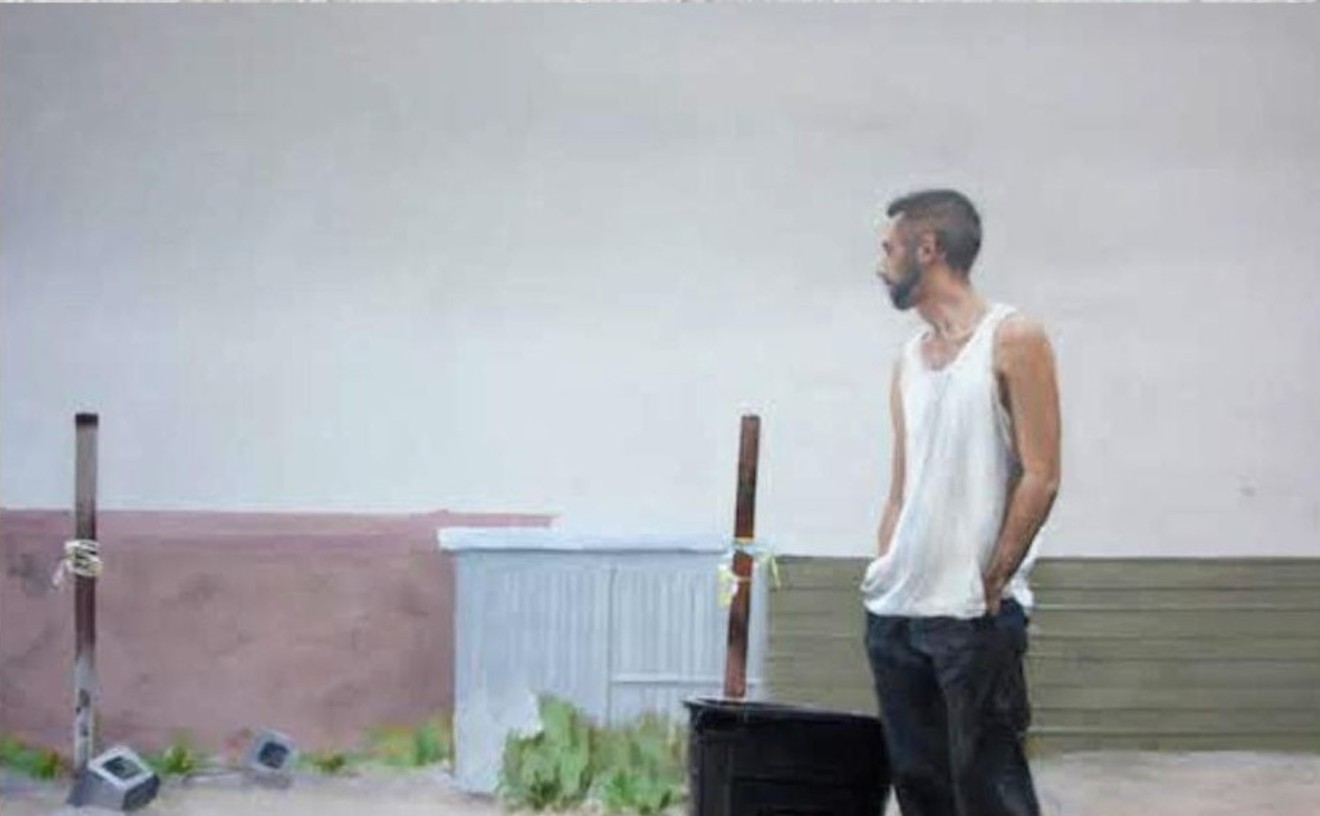As a result, owner Helen Hestenes announced the Icehouse's impending closure, which sent major shockwaves through the local arts community.
One year later, however, the Icehouse's future is bit brighter. It's still open, having hosted a variety of homegrown fundraisers (not to mention weddings and corporate events) to help alleviate its financial woes.
Meanwhile, a number of avant-garde art displays have taken place at the venue over the past six months, including Jenny Gentry's unusual water-themed "H20" show and the cross-disciplinary "Mnemosyne" exhibition featuring brain-bending works by ASU students.
According to artists Peter Conley and Quincy Ross, you can expect similar exhibitions and events to take place at the Icehouse in the coming months. The duo hopes to give the historic venue, which was built in 1910, a new lease on life and increase its prominence by hosting unique events and transforming it into an arts epicenter on First Fridays and other nights throughout the month.
"Our goal is really is to get the creative community to rediscover the Icehouse and to keep a constant flow of energy going here," Conley says. "We feel like this could really be a sanctuary for the arts in downtown where people could come and experience something they wouldn't normally elsewhere."
Conley, the director of the non-profit organization that runs the Icehouse, has been collaborating with Ross and artist Barry Schwartz on developing new uses for the historic multi-room venue, which originally opened in 1910 as Constable Ice Storage.
In the two decades since Hestenes reopened the property as the Icehouse in 1990, its cavernous Cathedral and Column rooms have hosted cutting edge art installations and epic large-scale works. Conley and Ross, however, are considering to make use of other parts of the venue, such as turning storage areas on the upper floors into an art and architectural libraries or perhaps a theatre for avant-garde films.
The building adjacent to the Icehouse's courtyard could potentially provide space for a coffeehouse, boutique, or a pop-up business of some sort. Conley also hopes to expand the small urban garden in the courtyard and turn it into an "art park."
"We're looking to create lovely green area which we'd call our Inner-City Eden (or I.C.E. for short) where people can come and sit, use their computers, enjoy a cup of coffee, and basically relax and take advantage of this space."
Schwartz, who specializes electricity-infused installations, hosted a few late-night art parties over the last year at his studio and event space inside the Icehouse (which is dubbed the "Shocklick Lounge"). More recently, however, he held a pair of brainstorming sessions with fellow artists to help come up with ideas for both the lounge and the Icehouse.
Meanwhile, Ross has been busy behind the scenes at the Icehouse since the summer. Besides bringing the hipster crowd to the venue via his signature after-hours affairs (like Turntables and Tamales and Friday After First Friday) Ross has been working with Conley on making his ideas for the Icehouse reality.
"The Icehouse has a lot of history and a lot of untapped potential, which is what I like about the buildings and spaces that I create in," Ross says. "I also have my own goals and ideas of what myself and others can provide for the space."
Ross is also "really excited" about utilizing the Icehouse's towering walls as potential canvases for large-scale works. ("This place allow space for significant creations," he says.) The giant white space on a brick wall adjacent to the Icehouse's loading dock, for instance, might become framed murals consisting of six removable panels that would be displayed for up to three months.
"It could be the new mural spot that people would want to create on. And it could be the sort of thing that draws people in to see the new mural they keep hearing about," Ross says.
While he's excited about Ross and Schwartz's ideas, Conley says he's being cautious about what can be accomplished.
"The fact of the matter with Quincy is that he tends to be very edgy." Conley says. "But for [the Icehouse], we need to kind of keep it in check a little bit. [We're] trying to find a common ground where he can pursue the things he finds interesting, I can pursue the things I want to happen, and we can both realistically make them happen."
One of the factors in turning ideas into reality is money. While weddings, special events, and fundraisers -- including an estimated $4,300 from Hugo Medina's benefit -- helped alleviate money issues and stave off the Icehouse's closure, Conley says they still have $24,000 in property taxes every year (not to mention their mortgage payments).
"The fact is this past year basically was about trying to just get a stable footing, and to be able to pay our bills with events and any number of things," he says. "We were pretty successful at it and for the first time in awhile we were able to start paying our bills, meet our monthly budget, and not just borrow money just to survive. But property taxes aren't going away. The county just kills us with those and it's still a little bit of a gray cloud over our heads."
Still, he's optimistic.
Ross and Conley are considering creating an "Icehouse Society" and offering memberships to the venue, which would offer such perks as invitations to exclusive events. There's also a possibility of seeking corporate sponsorship, and holding additional fundraisers throughout the year.
Ross says they're going to start holding Open House events one Thursday a month starting sometime in February "for people who have ideas and want to support and help the Icehouse," as well as check out the space and the artwork already being exhibited.
"People can come and cruise around explore all the nuances of the Icehouse [and] see something new," he says. "We're sort of on an island here, so it's going to be a challenge to make a lot of things happen and a struggle to get people aware of it. But if we can present interesting things at the Icehouse, people do find their way here."











